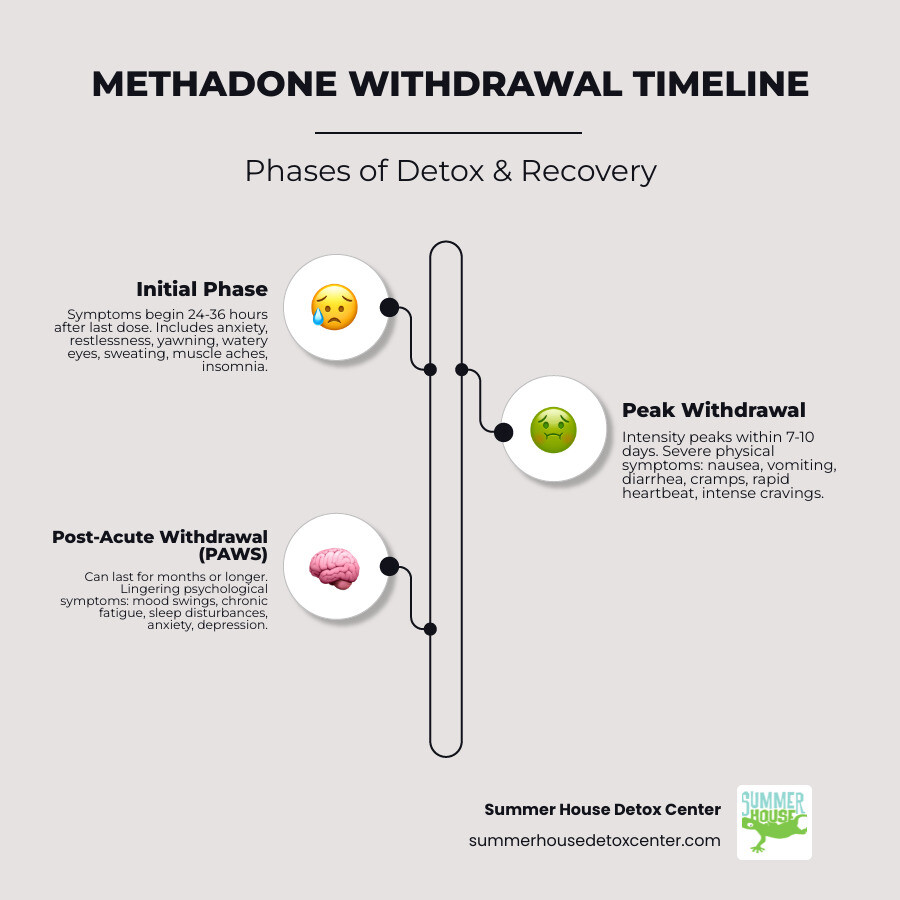Understanding the Reality of Methadone Withdrawal
Understanding methadone detox symptoms is the first step toward recovery. If you’re considering stopping methadone or struggling with withdrawal, you’re not alone, and help is available.
Common methadone withdrawal symptoms include:
- Physical symptoms: Muscle aches, sweating, nausea, diarrhea, chills, rapid heartbeat
- Psychological symptoms: Anxiety, depression, irritability, intense cravings
- Timeline: Symptoms typically begin 24-36 hours after the last dose and can last 3-6 weeks.
- Peak intensity: Usually occurs during the first 7-10 days.
- Long-term effects: Some symptoms may persist for months (Post-Acute Withdrawal Syndrome).
Methadone, a long-acting opioid used in Medication-Assisted Treatment (MAT), helps people recover from opioid addiction. Over time, the body develops a physical dependence on it, which is a natural adaptation and not the same as addiction.
When you stop taking methadone, your body must readjust. This re-regulation of brain chemistry causes withdrawal symptoms, a normal but often intense and uncomfortable process.
Understanding the difference between physical dependence and addiction is crucial. Dependence means your body needs the drug to feel normal, while addiction involves compulsive drug-seeking despite negative consequences. Many people on methadone are dependent but not addicted.
The withdrawal experience varies based on dosage, duration of use, overall health, and whether you taper or stop abruptly.
For residents in Miami and throughout Florida, understanding these symptoms is crucial for planning a safe detox. Medical supervision can make the difference between a dangerous withdrawal and a manageable recovery process.

Methadone detox symptoms terms to learn:
A Comprehensive Guide to Methadone Detox Symptoms
Understanding methadone detox symptoms means knowing what’s happening in your body. Your brain adapts to methadone by changing how opioid receptors function. When the medication is stopped, this balance is disrupted.
This imbalance causes opioid withdrawal syndrome, where your body goes into overdrive to readjust, leading to challenging flu-like feelings. The combination of physical and psychological distress is your body’s natural healing process.

While rarely life-threatening, these symptoms are debilitating and carry a high risk of relapse if managed alone. At Summer House Detox Center in Miami, we focus on making detox safe and comfortable, addressing both physical and emotional needs.
For a deeper dive into this topic, you might find our comprehensive Methadone Detox 101 guide helpful.
Initial Symptoms: The First 24-72 Hours
Early symptoms typically appear 24 to 36 hours after your last dose. Anxiety and restlessness often appear first, making it hard to sit still. You may also experience frequent yawning, watery eyes, and a runny nose.
Your body’s systems react with constant sweating and persistent muscle aches that make rest difficult. Perhaps most frustrating is insomnia. Despite exhaustion, your brain prevents sleep, creating a cycle of fatigue.
These initial methadone detox symptoms might feel manageable, but they often signal a more intense journey ahead.
Peak Withdrawal Symptoms: The First 1-2 Weeks
Symptoms intensify and peak between 3 to 10 days after the last dose, though this can vary, making this phase unpredictable.
The digestive system is hit hard, with frequent diarrhea, nausea, vomiting, and severe abdominal cramps, making hydration difficult. Classic signs like goosebumps appear as your nervous system misfires. The cardiovascular stress leads to high blood pressure and a rapid heartbeat, highlighting the need for medical monitoring.
Psychological symptoms are equally challenging, including overwhelming drug cravings and swings of depression and irritability, leaving you feeling emotionally raw.
This is where professional support makes all the difference. Our Miami facility specializes in helping people steer these intense weeks with proper medical care and emotional guidance. You can learn more in our article about Side Effects and Long-Term Effects of Methadone.
The Risk of Psychosis and Severe Methadone Detox Symptoms
While most methadone detox symptoms are physical and emotional, rare but serious complications like withdrawal-induced psychosis highlight the need for medical supervision.
Though uncommon, psychosis is a real risk requiring immediate medical attention. Symptoms include paranoia, hallucinations (seeing or hearing things that aren’t there), delusions (firmly held false beliefs), and confusion.
A documented case of a patient developing severe paranoia and confusion after stopping methadone abruptly shows why unsupervised detox is dangerous. The symptoms resolved only with medical intervention. The cause isn’t fully understood but is likely related to changes in brain chemistry, especially dopamine pathways affected by opioids.
At Summer House Detox Center, our experienced staff recognizes these warning signs and responds immediately with appropriate medical intervention. Your safety is our top priority. You can read more about this documented case in this NCBI case report on psychosis.
The Methadone Withdrawal Timeline and Influencing Factors
Understanding the methadone withdrawal timeline is crucial. Unlike withdrawal from short-acting opioids, it’s a marathon, not a sprint, and the experience is different for everyone.

The process has three phases: onset (24-36 hours post-dose with initial flu-like symptoms), the acute phase (2-6 weeks, with symptoms peaking and then easing), and the post-acute phase (months or years of continued brain healing).
The unpredictability of methadone withdrawal is challenging. At our Miami facility, we’ve seen durations range from a few weeks to several months, depending on the individual. This variability is why we take an individualized approach at Summer House Detox Center.
Factors Influencing Severity and Duration
Many factors influence withdrawal severity. Our team in Miami creates personalized detox plans by considering how your history affects your body’s response to stopping methadone.
- Dosage and Duration of Use: Higher doses and longer use typically lead to more intense, prolonged methadone detox symptoms as the body is more deeply adapted.
- Individual Metabolism: Your metabolism, influenced by genetics, age, and health, affects how quickly methadone leaves your system.
- Physical Health: Pre-existing conditions can intensify symptoms, which is why our Florida medical team provides close monitoring.
- Co-occurring Mental Health Conditions: Conditions like anxiety or depression often intensify during detox.
- Polysubstance Use: Using other substances like alcohol or benzodiazepines complicates withdrawal, making it more dangerous.
- Method of Cessation: Quitting “cold turkey” causes severe symptoms, whereas a medically supervised taper is a much safer and more comfortable approach.
Post-Acute Withdrawal Symptoms (PAWS)
After acute withdrawal, many experience Post-Acute Withdrawal Symptoms (PAWS). These primarily psychological methadone detox symptoms can persist for months or even up to two years.
PAWS can be surprising, with persistent symptoms like mood swings, chronic fatigue, and sleep disturbances appearing after the acute phase. Anhedonia (the inability to feel pleasure), anxiety, and poor concentration are also common as your brain rewires itself to function without methadone.
The good news is that PAWS symptoms fade with time. Our aftercare planning here in Florida helps you prepare for this phase and connects you with ongoing support. For more detailed guidance, check out our article on how to get off methadone.
How Methadone Withdrawal Differs from Other Opioids
Methadone withdrawal differs significantly from that of other opioids, which is why specialized care is so important. Methadone’s long half-life (8-60 hours) means it stays in your system longer, causing a delayed onset of withdrawal, sometimes starting up to a week after the last dose.
This also leads to a protracted withdrawal period. Symptoms can last for weeks or months, unlike the 4-10 days typical for short-acting opioids.
| Withdrawal Aspect | Methadone | Short-Acting Opioids |
|---|---|---|
| Symptoms Begin | 24-36 hours (up to 7 days) | 6-12 hours |
| Peak Intensity | 3-7 days (can extend longer) | 24-72 hours |
| Acute Phase | 2-6 weeks (sometimes up to 6 months) | 4-10 days |
| PAWS Risk | High, lasting months to years | Present but often shorter |
| Overall Experience | Prolonged and gradual | Intense but shorter-lived |
This prolonged nature is why attempting methadone detox alone is so challenging and why medical supervision is essential for success and safety.
Safely Managing Withdrawal: The Importance of Medical Detox
You don’t have to face methadone detox symptoms alone. Choosing medical supervision is the most important decision for your safety. At Summer House Detox Center in Miami, we provide a safe, comfortable, and private environment where your healing can begin.
Unsupervised methadone withdrawal can be dangerous. Complications like severe dehydration from vomiting and diarrhea can strain your heart and kidneys. Malnutrition weakens your immune system, and cardiac stress is a major risk, especially with underlying health conditions. The overwhelming psychological distress, including intense anxiety, depression, and cravings, can feel unbearable and often leads to relapse.
Crucially, tolerance drops significantly after abstinence. A relapse at a previous dosage level can lead to a life-threatening overdose. Medical monitoring is not just for comfort—it’s for your survival.
Our team in Miami understands these risks. We monitor your vital signs around the clock, ensure proper hydration, and provide immediate intervention if complications arise, offering the emotional support that makes this process manageable.
The Dangers of Quitting “Cold Turkey” at Home
Quitting “cold turkey” at home is extremely dangerous. Without medical support, methadone detox symptoms can spiral, leading to severe complications. These include dehydration and malnutrition which can cause organ damage, dangerous electrolyte imbalances that can disrupt heart rhythms, and severe cardiac stress. The psychological toll, including overwhelming anxiety and cravings, makes relapse highly likely. Tragically, because tolerance drops during detox, a relapse can easily lead to a fatal overdose.
At Summer House Detox Center, we are passionate about providing a safer path forward than the “cold turkey” approach.
The Role of Tapering in a Medical Setting
Tapering is a gradual dose reduction that allows your body to adjust slowly, making withdrawal significantly more manageable and safer than stopping abruptly. Our physician-guided tapering schedules are personalized. We consider your dosage, duration of use, health, and personal goals to create a unique plan for you.
Proper tapering minimizes symptom severity, making the process far more comfortable. When withdrawal symptoms are manageable, you’re less likely to give up, which reduces relapse risk and increases your chance of success.
Our medical team in Miami takes pride in creating tapering schedules that work, always keeping your safety and comfort as our top priorities. For more detailed information, visit our guide on the best way to get off methadone.
Medical and Therapeutic Support in Florida
In Miami, our comprehensive support system addresses all aspects of methadone detox symptoms. We combine medical care with compassionate, holistic support, treating the whole person.
Our medical interventions are customized to your needs and may include medications like clonidine for anxiety and aches or loperamide for diarrhea, along with treatments for nausea and insomnia. IV therapy provides essential hydration, vitamins, and electrolytes, and we offer nutritional support with carefully planned meals to aid recovery.
Beyond medication, we integrate holistic therapies like mindfulness and gentle movement to support your mental well-being and help you develop long-term coping skills. What makes our Miami facility special is our experienced staff, many of whom are in recovery. They provide unparalleled empathy and hope, creating a true healing environment.
For additional resources throughout Florida and beyond, the SAMHSA Treatment Locator can connect you with state-licensed help: SAMHSA Treatment Locator.
Frequently Asked Questions about Methadone Detox
It’s natural to have questions about methadone detox. We’ve heard these concerns from our clients in Miami and want to provide honest answers to help you make informed decisions.
Can methadone withdrawal symptoms last for months?
Yes, methadone detox symptoms can last for months. While acute physical symptoms ease in a few weeks, Post-Acute Withdrawal Syndrome (PAWS) can cause psychological and emotional challenges to persist much longer. Your brain needs significant time to rebalance its chemistry after adapting to methadone’s presence. These lingering PAWS symptoms can include anxiety, depression, and sleep problems. While frustrating, this is a normal and temporary part of recovery, which is why we emphasize ongoing support after you leave our Miami facility.
What is the difference between methadone addiction and dependence?
Understanding the difference between addiction and dependence is crucial, as the two are often confused.
Physical dependence is a natural adaptation where the body gets used to methadone. If the medication is stopped, withdrawal symptoms occur as the body readjusts. This happens even when taking methadone exactly as prescribed.
Addiction is a complex brain disease characterized by compulsive drug-seeking and use despite harmful consequences.
If you’re on Methadone Maintenance Treatment (MMT) as prescribed, you are dependent but not necessarily addicted. You’re using methadone as a tool to manage opioid use disorder.
Why is it so important to seek medical supervision for methadone withdrawal?
Attempting methadone withdrawal alone is dangerous. Medical supervision is essential for several critical reasons:
- Medical Safety: Physical symptoms can become life-threatening. Complications like severe dehydration, electrolyte imbalances, and cardiac stress require medical monitoring.
- Psychological Stability: Psychological distress can be overwhelming. Intense anxiety and cravings are common, and in rare cases, psychosis can occur, requiring immediate medical intervention.
- Relapse and Overdose Prevention: Medical supervision drastically reduces the risk of relapse and subsequent overdose. During withdrawal, cravings are intense, and a relapse after tolerance has dropped can be fatal.
At Summer House Detox Center in Miami, our team provides 24/7 monitoring, medication management, hydration, and emotional support. Professional care keeps you safe and makes the process manageable, increasing your chances of long-term success.
Conclusion: Your First Step Towards a Life Beyond Methadone
The journey through methadone detox symptoms is challenging, but understanding the stages of withdrawal—from onset to post-acute symptoms—is the first step. While every journey is unique, one thing is constant: you don’t have to face it alone.
The physical and emotional symptoms, along with rare but serious complications, underscore why professional help is essential. Detoxing at home, especially “cold turkey,” carries severe risks, including dehydration, cardiac stress, and a high chance of a fatal overdose upon relapse.
There is genuine hope in recovery. At Summer House Detox Center, we’ve seen countless individuals successfully steer methadone withdrawal. Our Miami facility provides the medical supervision, personalized care, and compassionate support that transforms a dangerous ordeal into a manageable step toward freedom.
Our experienced team, many with personal recovery experience, creates individualized detox plans focused on your comfort and safety, using medical and holistic therapies with 24/7 monitoring.
Your story of recovery can begin today. Here in Florida, you have access to the professional, medically supervised care that makes successful detox possible. The path beyond methadone is about stepping into a life of renewed possibility and genuine healing.

